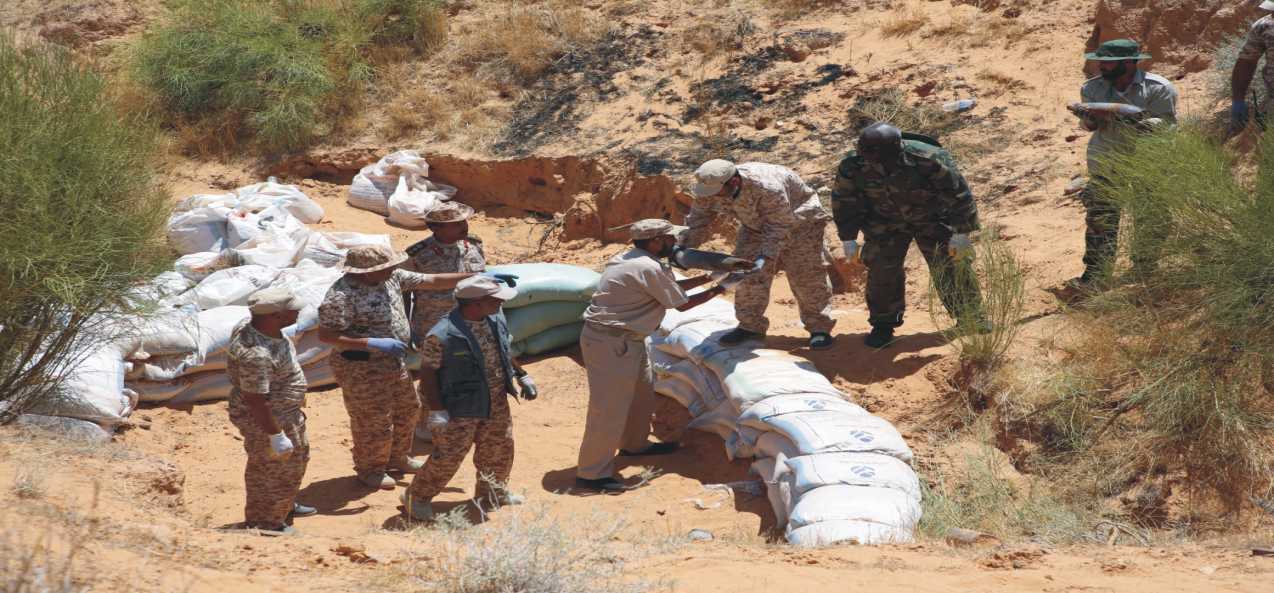Libya: Wagner mined – UAE exploded – Egypt smiling
Despite the successive internal and regional declarations of support for the new Libyan government led by Dabaiba, regional parties began to weave spider threads in preparation for the assault on the nascent Libyan unity, in single moves, very similar to the operations of individual wolves for ISIS, so they move here and another there is monitored by UK News Line.
The Libyan army announced on March 12 that it had monitored the return of Russian Wagner mercenaries and Janjaweed to the city of Sirte, and Brigadier General Al-Hadi Dara, a spokesman for the “Sirte Liberation Operations Room – Al-Jufra” confirmed the arrival of 12 buses carrying Wagner mercenaries and Janjaweed to Al-Qardabiya base in Sirte, referring to the return of the mercenaries to Their previous positions were in the Galat camp as well, and they are spreading there.”

It is noteworthy that a report by the Associated Press last February confirmed that the UAE dismantled its Eritrean military base in Assab, which it had established in 2015, and recently an investigation by Al-Jazeera revealed the transfer of military equipment and vehicles from the Assab base to the port of Alexandria in northern Egypt, and said The investigation that the ship transported more than 1,300 military vehicles and self-propelled guns to Alexandria, and the military cargo by train from the port of Alexandria to the Sidi Barani base near the Libyan border.
Satellite images showed that the number of vehicles at the Sidi Barani base has increased five times compared to last year, in addition to the Patriot missile systems that the UAE transferred to the Sidi Barani base.
The base, which was named the Muhammad Naguib Base after the first presidents of Egypt, is described as the largest military base in Africa and the Middle East, and the base has been linked to Abu Dhabi’s involvement in the Libyan crisis, and to the Egyptian-Emirati support for the retired Libyan General Khalifa Haftar, whose role declined with the progress of the settlement in Libya, which led It raises questions about the goal of these Emirati moves.
The Libyan-Turkish agreement and the Emirati moves are fears and concerns
International and regional guarantees may not allow the passage of any weapons and military equipment towards the Libyan territories, and the Libyan-Turkish military agreement may play a major role in tracking and monitoring any upcoming security breaches of the Libyan ally, so are the current international trends sufficient to protect the nascent government.
Although the Libyan crisis witnessed a lull by Cairo, amid talk of its refusal to continue betting on Haftar as Abu Dhabi wants, Abu Dhabi’s transfer of military equipment to the Sidi Barani base raises fears of an Emirati attempt to spoil the political settlement efforts in Libya, political analyst Abdul Aziz Al-Ghanai told Larbi. Post.
Al-Ghanami added that the construction of the Sidi Barani base of this magnitude constituted a shift in the historical trends of Egyptian national security, which focused on threats from the West and the South, and this came in line with the orientations of the Egyptian-Emirati coalition after June 30, 2013, which focused on the position of the Arab Spring hostility, which is what He appeared in support of the coup d’etat of retired Libyan general Khalifa Haftar against the political process in Libya.
Read more: Biden declares his desire to end War in Yemen
The UAE’s strengthening of its military presence near the Libyan-Egyptian borders comes within the framework of the continuous Egyptian-Emirati support for retired Major General Khalifa Haftar, taking advantage of the Libyans’ preoccupation with forming a new executive authority, said a member of the Libyan Supreme Council in Al-Qasim Debarz.
Debars added: “Egypt and the UAE will not simply abandon their ally Haftar in Libya, and they may work to install him in a new military coup as the leader of the Libyan state, and therefore they will reinforce their presence near our eastern borders,” stressing that fears of continued support for Haftar militarily in order to wage a new war on the region. Al-Gharbia’s concerns exist with everyone, are closely watched, and are “dangerous to stability in Libya.”
Military expert and former officer in the Libyan army, Adel Abdul Kafi believes that caution is important in this difficult stage, but he ruled out that the UAE will repeat the previous predicament in supporting Haftar militarily after his humiliating loss in Tripoli, but at the same time it does not want to lose its agents in Libya, and seeks to continue in The Libyan political scene awaits the results of the next post-election period. ”
Political analyst Abdullah al-Kabir denied the existence of a deliberate intention by the UAE and Egypt to attack the political process in Libya, saying: I do not think that the UAE or Egypt is going to support a new war in Libya, as this contradicts the international trend towards resolving the Libyan crisis peacefully, and confirming the futility of military solutions, The decision or not to go to war in Libya is owned by the major powers and not in the hands of the regional parties that submit to the current political changes in the region after the US elections.


Comments are closed.